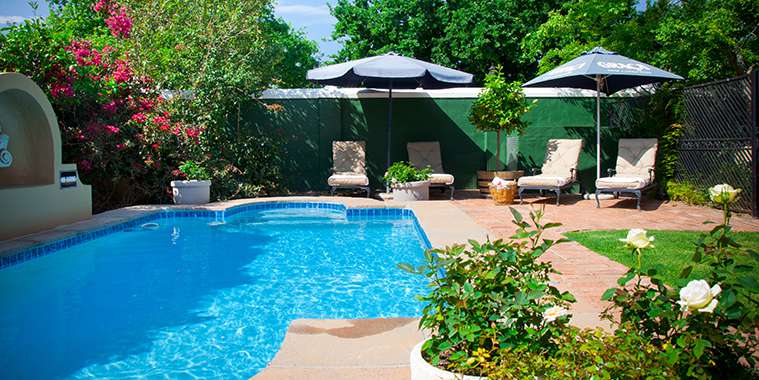If you’re frowning at the thought of a saltwater pool, it’s probably because you’ve emerged from the Caribbean after a day of snorkelling and been anxious to “get the salt off” already. It’s itchy and can leave your skin covered in a dry, white film. So, why in the world are people going bonkers for saltwater pools?
Upscale spas and hotels were the first to introduce the saltwater concept to many pool hoppers. Traditional freshwater pools rely on a big dose of chlorine to combat algae and bacteria triggered by the sun and cannon ballers. Saltwater systems are becoming a popular alternative for homeowners frustrated with traditional chlorine systems.
Chemistry class
If you skipped chemistry in high school, here’s the poolside lounge chair version. Saltwater pools rely on electrolytic chlorine generators (ECG) to separate the sodium chloride in the pool water into two primary elements: sodium and chloride. One of the essential elements is surprisingly, a pure chlorine — albeit a much less potent version than found in chlorinated pools. The chlorine is then circulated into the pool to sanitize and disinfect the water.
Saltwater vs. chlorine: What are the benefits?
Saltwater is gentler on hair, skin, eyes, swimsuits, and the occasional belly flop from the pet dog. Ask any blonde-haired individual who has emerged from the summer swimming season with straw-like hair with a distinct lime tint!
There’s a reason why salt caves and Epsom salt baths are popular. They’re good for you and require zero effort or exertion! Saltwater pools can also be very curative for chronic skin conditions like eczema, psoriasis and acne. Allergy sufferers who rely on neti pots may notice a change in their breathing passages, too, thanks to inhaling the fine salt particles.
The biggest advantage of saltwater pools is sensory. The saltwater system doesn’t produce the pesky chloramines responsible for the signature “chlorine smell” of a public pool. Chloramines are the by-product of store-bought chlorine and the disinfectant is blamed for bloodshot eyes and crying kiddos wondering why their eyes are stinging.
If you’ve grown weary of frequently testing the chemical levels, saline systems don’t require the same monitoring and testing — it’s a real eye opener! Your muscles will enjoy the soak and the natural detox of saltwater can help relieve anxiety.
The deep end: the downside of saltwater pools
If you have a water softener in your home, there’s a high probability you’ve noticed spots on your glassware and over time, “etching” or a residue on your shower doors. With saltwater pools, the same salt stains can corrode metal lights, deck screws, and patio furniture (wood and cushions). Investigate proper sealants for any decking that surrounds your pool or better yet, spray the surface after use.
Be aware that saltwater systems require electricity and will add to your energy bill! Canada’s colder climate means a salt chlorine generator doesn’t have to work as hard as it would in an equatorial location, but it’s still working behind the scenes. The salt chlorine generator turns salt into chlorine by passing electricity through the saltwater solution. For this reason, you can expect your electric bill will be a bit higher each year when you choose saltwater over chlorine.
A 20,000-gallon saltwater pool will generally use about 500 watts of power to run the generator per year. Review your current hydro plan and see if this is feasible for you.
Saltwater pool maintenance
Saltwater pools are attractive to many because they can self-maintain for up to two weeks instead of the manual, weekly addition of chemicals a traditional pool requires. The generator cells need to be replaced every few years as well — they must be cleaned two to four times a year to remain efficient.
How much does it cost to install a saltwater pool?
Chlorinating a saltwater pool can be substantially cheaper as the system doesn’t require the frequent addition of chemicals. The ECG keeps the chlorine levels constant but the initial installation costs are the biggest expense to consider. You may have to upgrade pool equipment and linings to salt-resistant parts. Ask your pool company about the benefits of installing a zinc anode to help offset the effects of switching from a chlorine pool to saltwater.
Saltwater pools cost around $1,000 annually. It’s important to consider replacement costs in your decision-making as saltwater systems require salt chlorine generators. The lifespan of a generator is around seven years and is approximately $2,500 to replace.
Chlorine pools and the necessary chemicals can cost about $800 annually. Converting a 50,000 gallon chlorine pool to saltwater could cost between $1,050 to $3,115, depending on the salt system you choose. Higher-priced models will have features like digital salt readouts, diagnostics, and self-cleaning mechanisms. This conversion figure is also dependent on installation labour, generator, salt cells, and salt costs in your area.
You can also convert your hot tub into a saltwater system. You’ll still need to shock it occasionally but eliminating bromine or chlorine means you will have a new, easy recipe to follow: add two pounds of salt per 100 gallons of water. The system will break down the salt as needed and magically convert it to chlorine.
Switching to salt is healthy, budget-savvy, and environmentally responsible — your skin and bikinis will thank you!
— Realtor.ca



